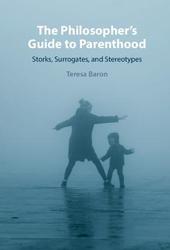
|
The Philosopher's Guide to Parenthood: Storks, Surrogates, and Stereotypes
Hardback
Main Details
| Title |
The Philosopher's Guide to Parenthood: Storks, Surrogates, and Stereotypes
|
| Authors and Contributors |
By (author) Teresa Baron
|
| Physical Properties |
| Format:Hardback | | Pages:218 | | Dimensions(mm): Height 229,Width 152 |
|
| Category/Genre | Ethics and moral philosophy
Social and political philosophy
Parenting |
|---|
| ISBN/Barcode |
9781009299244
|
| Classifications | Dewey:649.1 |
|---|
| Audience | |
|---|
| Illustrations |
Worked examples or Exercises
|
|
Publishing Details |
| Publisher |
Cambridge University Press
|
| Imprint |
Cambridge University Press
|
| Publication Date |
5 January 2023 |
| Publication Country |
United Kingdom
|
Description
Our understanding of what it means to be a parent in any given context is shaped by our biological, social, legal, and moral concepts of parenthood. These are themselves subject to the influence of changing expectations, as new technologies are produced, cultural views of the family are transformed, and laws shift in response. In this book Teresa Baron provides a detailed and incisive overview of the key questions, widespread presuppositions, and dominant approaches in the field of philosophy of parenthood. Baron examines paradigm cases and problem cases alike through an interdisciplinary lens, bringing philosophy of parenthood into dialogue with research on family-making and childrearing from across the social sciences and humanities. Her book aims to answer old questions, draw out new questions, and interrogate notions that we often take for granted in this field, including the very concept of parenthood itself.
Author Biography
Teresa Baron is a Research Fellow at the University of Nottingham, and works on philosophy of parenthood and reproductive ethics.
Reviews'Baron's book is a rigorously argued, lucidly written and comprehensive account of parenting rights, roles and responsibilities, showcasing the complex nature of questions about what makes someone a parent. Baron argues in favor of theorizing distinctions between biological, legal, moral and social parenthood, and demonstrates that a nuanced approach lends clarity to ethical debates. This is top-notch philosophical work that speaks to urgent contemporary dilemmas.' Amy Mullin, University of Toronto Mississauga
|